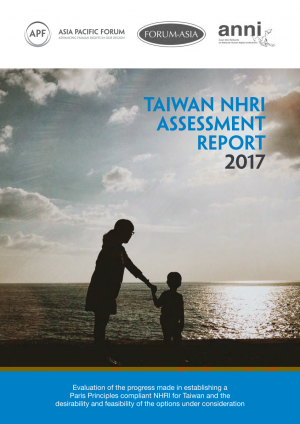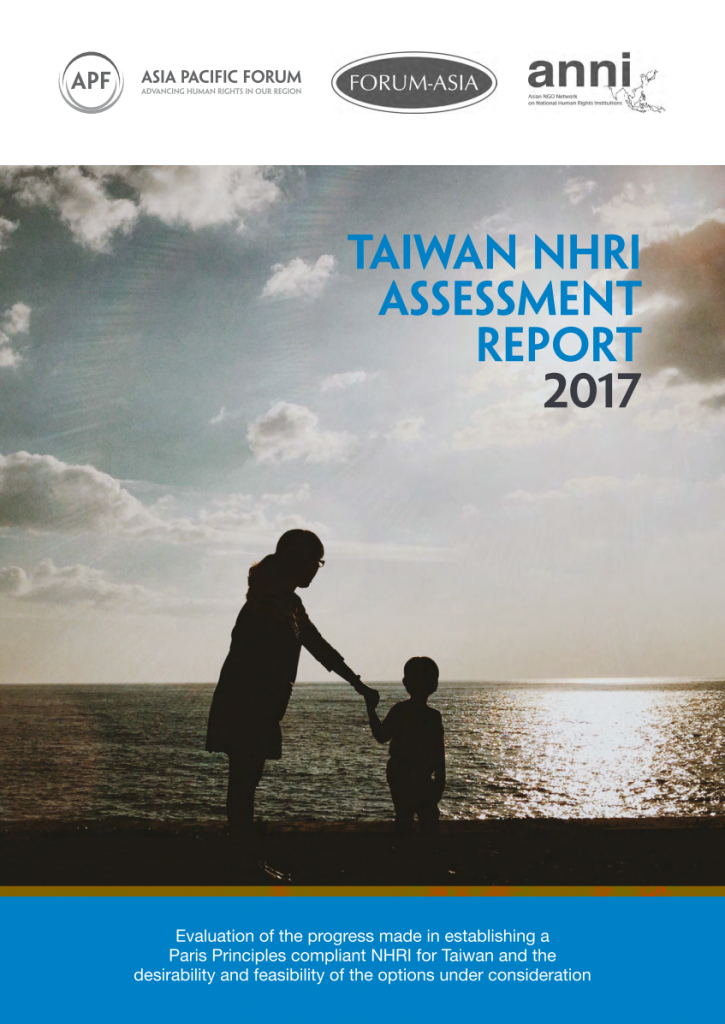
Taiwan NHRI Assessment Report 2017
- Published in: November 2017
- Page: 32
- Publisher: APF
Executive Summary
Taiwan’s civil society organisations have been advocating for the establishment of a National Human Rights Institution (NHRI) since 1999. In 2014, a taskforce formed within the Presidential Office Human Rights Consultative Committee (POHRCC) concluded that Taiwan should establish a NHRI. At that time four options were available, with three options identified by the taskforce and Control Yuan submitted a separate proposal to the POHRCC.
President Tsai committed to establishing a NHRI during the election campaign of 2016 and, more recently, undertook to make a decision by the end of 2017.
To assist the President with that decision and following discussions with the POHRCC, Covenants Watch (Taiwan) invited Ms. Rosslyn Noonan of the Asia Pacific Forum of National Human Rights Institutions (APF) to lead a task force to Taiwan for a one-week visit to conduct an assessment of the on-going process of establishing a National Human Rights Institution (NHRI).
Members of the task force came under the auspices of the Asian Forum for Human Rights and Development (FORUM-ASIA), the Asian NGO Network on NHRIs (ANNI), and the Asia Pacific Forum of NHRIs (APF).
Task force members, in addition to Ms Noonan, were Mr Sushil Pyakurel, a foundation member of the Nepal Human Rights Commission and Mr Agantaranansa Juanda, at that time serving in his capacity as Programme Coordinator of ANNI.
The Task Force members acknowledge that:
- the status of Taiwan under international law is contested by the People’s Republic of China (PRC) and the Republic of China (ROC)
- the authors of the report explicitly do not make any comment on this issue, and
- the use of the terminology NHRI in the report should not be construed as endorsing Taiwan as a nation state.
Drawing on their extensive experience with NHRIs worldwide, the task force members were asked to evaluate the views of key stakeholders on the desirability and feasibility of setting up such an institution; they were also asked to provide expert opinions on the several proposals that were currently under consideration in terms of compatibility with the Paris Principles.
During the week in Taiwan, the President’s Office invited the task force to provide a briefing to the POHRCC, hosted by Vice President Chen.
While in Taiwan, the task force consulted with:
- government agencies including Ministry of Education, Ministry of the Interior, Ministry of Justice,
and Gender Equality Department of Executive Yuan - the Legislative Yuan, the Judicial Yuan and the Control Yuan
- members of political parties
- civil society groups and organisations
- members of academia and the legal profession.
They also:
- provided an initial briefing at the end of the visit to the Vice President and members of the POHRCC
- held a press conference summarising initial conclusions of the task force.
In arriving at the conclusions and recommendations, the task force took account of the views of those consulted, the advice of constitutional and legal scholars, the unique Taiwan context with its five powers, the most efficient use of resources, and the ‘Paris Principles’ – the international guidelines for the establishment of a NHRI.


